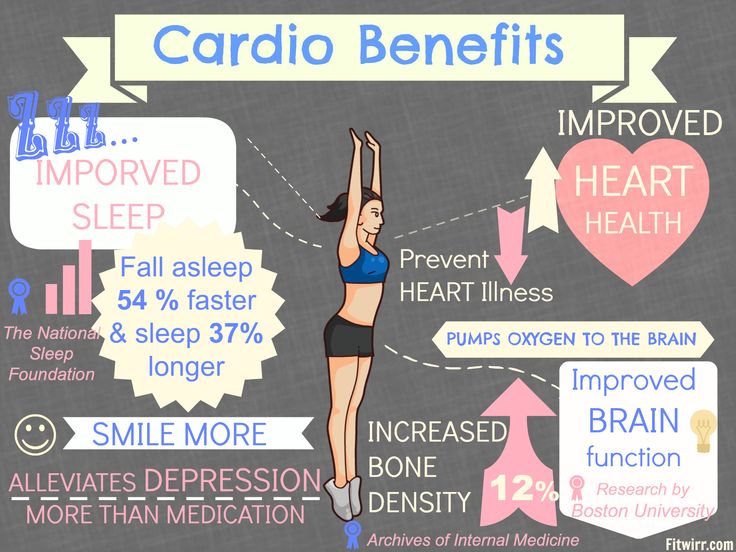Cardio exercises have numerous scientifically proven benefits, including reducing the risk of heart and blood vessel conditions, increasing longevity, strengthening the heart and lungs, and making everyday tasks easier. Additionally, they help maintain a healthy weight, improve stamina and fitness, ward off viral illnesses, manage chronic conditions, keep arteries clear, and boost mood.
Consistently engaging in aerobic exercise allows the heart to pump blood more efficiently throughout the body, improving overall health. Regular cardio can also improve blood flow, preventing heart attacks by reducing blockages in the small vessels around the heart. These physical and mental health benefits make cardio workouts a valuable addition to any fitness routine.

Credit: www.garagegymreviews.com
Understanding Cardiovascular Endurance
What Is Cardiovascular Endurance?
Cardiovascular endurance refers to the ability of your heart, blood vessels, and lungs to efficiently deliver oxygen and nutrients to your muscles during exercise over a sustained period of time. It is a crucial component of overall fitness and is often associated with aerobic exercises such as running, swimming, cycling, and dancing.
How To Improve Cardiovascular Endurance
Improving your cardiovascular endurance can have numerous benefits for your health and overall well-being. Here are some effective ways to increase your cardiovascular endurance:
- Engage in aerobic exercises: Incorporate activities that elevate your heart rate into your fitness routine, such as running, cycling, swimming, or brisk walking.
- Interval training: Alternate between high-intensity bursts of exercise and periods of active recovery to challenge your cardiovascular system.
- Cross-training: Mix different types of cardiovascular exercises to target different muscle groups and prevent boredom.
- Gradually increase intensity: Start with moderate-intensity workouts and gradually increase the duration and intensity over time.
- Consistency: Regularly engage in cardiovascular exercises to maintain and improve your endurance levels.
By incorporating these strategies into your fitness routine, you can enhance your cardiovascular endurance, leading to improved heart health, increased stamina, and enhanced overall fitness.
Benefits Of Cardiovascular Exercise
The Benefits of Cardiovascular Exercise are numerous and have been backed by scientific research. Cardio exercises, also known as cardiovascular exercises, are activities that increase your heart rate and promote better overall health. Engaging in regular cardio workouts can have a positive impact on various aspects of your health, including reducing the risk of heart and blood vessel conditions, improving heart and lung strength, lengthening your lifespan, and making daily tasks easier to complete.
Reducing The Risk Of Heart And Blood Vessel Conditions
One of the significant benefits of cardiovascular exercise is its ability to lower the risk of heart and blood vessel conditions. Regular cardio workouts help strengthen your heart muscle, improve blood circulation, and reduce the buildup of fatty deposits in the arteries. This leads to a decreased risk of conditions such as heart disease, high blood pressure, and stroke.
Longer Lifespan
Engaging in regular cardiovascular exercise can contribute to a longer and healthier life. Scientific studies have shown that individuals who routinely participate in cardio activities tend to have a longer lifespan compared to those who lead sedentary lifestyles. Regular exercise helps maintain healthy body weight, improves heart function, and reduces the risk of chronic diseases, ultimately leading to a longer and healthier lifespan.
Improved Heart And Lung Strength
Cardiovascular exercise is excellent for improving the strength and endurance of your heart and lungs. When you engage in activities like jogging, swimming, or cycling, your heart works harder to pump oxygenated blood throughout your body, thereby strengthening your heart muscle. Additionally, cardio workouts increase lung capacity and efficiency, allowing you to take in more oxygen and improve your respiratory function.
Effortless Completion Of Daily Tasks
Regular cardiovascular exercise also enhances your ability to complete daily tasks with ease. By improving your cardiovascular endurance, you’ll have more energy and stamina, making activities like carrying heavy objects, climbing stairs, or doing household chores feel effortless. This can lead to a better quality of life and increased independence.
Specific Benefits Of Cardio
Improve your cardiovascular health and reduce the risk of diseases with cardio exercises. Strengthen your heart, increase stamina, improve blood flow, and make everyday tasks easier with regular cardio workouts.
Cardio exercises offer a wide range of specific benefits that can positively impact your overall health and well-being. From weight management to reducing health risks, incorporating cardio into your fitness routine can have a profound impact on your physical and mental health. Below are some specific benefits of cardio that are backed by scientific research:Weight Management
Engaging in regular cardio workouts can be an effective tool for managing your weight. Cardio exercises such as running, cycling, or swimming help burn calories and fat, promoting weight loss or weight maintenance. Combining cardio with a healthy diet can create a calorie deficit, resulting in shedding those excess pounds.Increased Stamina, Fitness, And Strength
Cardiovascular exercises play a crucial role in enhancing your stamina, fitness, and strength. When you perform cardio activities, your heart and lungs work harder to provide oxygen to your muscles. Over time, this improves the efficiency of your cardiovascular system, allowing you to endure more physically demanding tasks and improve overall fitness levels.Boosting Mood
Regular cardio workouts have been shown to trigger the release of endorphins, also known as the “feel-good” hormones. These endorphins contribute to improved mood and can alleviate symptoms of anxiety and depression. Engaging in cardio exercises can be a natural way to boost your mood, increase energy levels, and reduce stress.Reducing Health Risks
Cardiovascular exercises have been linked to a reduced risk of various health conditions. Regular cardio workouts can help lower blood pressure, improve cholesterol levels, and reduce the risk of heart disease. Additionally, cardio exercises can also help manage and prevent other health conditions such as type 2 diabetes, stroke, and certain types of cancer.Managing Chronic Conditions
Including cardio exercises in your fitness routine can be particularly beneficial for managing chronic conditions such as arthritis, chronic pain, and respiratory illnesses. Regular cardio workouts can help improve joint flexibility, relieve pain, and increase lung capacity. It is important to consult with a healthcare professional to determine the appropriate level of intensity and duration for your specific condition.Keeping Arteries Clear
Cardio exercises, particularly aerobic activities, contribute to keeping your arteries clear and blood flowing smoothly. By improving blood circulation, cardio workouts help prevent the buildup of plaque on the arterial walls, reducing the risk of heart attacks and other cardiovascular diseases. To summarize, cardio exercises offer specific benefits that can improve your overall health and well-being. From managing weight and increasing stamina to boosting mood and reducing health risks, incorporating cardio into your routine can have a significant positive impact. Whether you choose running, cycling, swimming, or any other form of cardio, regular exercise can lead to a healthier and happier lifestyle. So why wait? Lace up your shoes and get started on reaping these scientifically-backed benefits of cardio today.
Credit: www.thelancet.com

Credit: www.healthline.com
Frequently Asked Questions For Benefits Of Cardio: 14 Science-backed Reasons To Do More Cardio
Why Is It Important To Improve Cardio?
Improving cardio is important because it reduces the risk of heart and blood vessel diseases, helps you live longer, strengthens your heart and lungs, and makes everyday tasks easier. Cardio also helps with weight loss, increases stamina and fitness, boosts mood, and improves blood flow.
Consistent cardio exercise strengthens the heart and allows blood to flow more efficiently throughout the body, preventing blockages and potential heart attacks.
What Does Cardio Help With The Most?
Cardio helps with the most in terms of: – Preventing weight gain – Increasing stamina, fitness, and strength – Boosting your immune system – Reducing health risks – Managing chronic conditions – Strengthening your heart – Keeping your arteries clear – Improving blood flow – Boosting your mood.
Why The Greatest Benefits To Cardio?
Cardio provides the greatest benefits because it strengthens your heart and lungs, reduces the risk of diseases, increases stamina and fitness, helps manage chronic conditions, boosts mood, and improves overall health by improving blood flow and circulation. Consistently doing cardio exercises allows blood to be pumped and moved more efficiently throughout the body, benefiting your heart and overall well-being.
What Happens To Your Heart If You Do Cardio Everyday?
Doing cardio every day improves blood flow and strengthens your heart. It helps prevent blockages and decreases the risk of heart attacks. Regular cardio also boosts overall cardiovascular health and allows your heart to pump blood more efficiently.
Conclusion
There are numerous science-backed benefits to incorporating more cardio into your fitness routine. Regular cardio exercise helps reduce the risk of heart and blood vessel conditions, prolongs your lifespan, and strengthens your heart and lungs. It also improves your overall health by aiding in weight loss, boosting stamina and strength, and reducing health risks.
Additionally, cardio promotes better blood flow, increases circulation, and helps prevent heart attacks. By consistently engaging in cardio activities, you can reap these benefits and improve your overall well-being.

